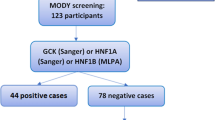Abstract
Insulin gene (INS) mutations are associated with a rare form of maturity-onset diabetes of the young (MODY). Here, we describe a proband with early-onset diabetes resulting from a heterozygous mutation in the promoter region of INS and summarize the clinical features of INS mutations caused by MODY (INS-MODY) reported in previous studies. The proband presented with proteinuria, mild hyperglycemia, and hypertension at the age of 39 years old; he was negative for the glutamic acid decarboxylase (GAD) antibody and had a family history of diabetes, including his father and aunt. The proband underwent whole exome sequencing, and the mutation in the proband and his father was verified by Sanger sequencing. A literature review was performed to examine all reported cases of INS-MODY to evaluate the clinical characteristics of the probands. A heterozygous INS mutation (c.-332C > G) was detected in the proband and his father, and their phenotypes had unique characteristics. Previous reports have described a total of 26 probands with 16 pathogenic mutations of the INS gene, with clinical features that exhibit great inter- and intrafamilial variability, and onset ages ranging from 2 years, 10 months to 62 years; 88% of patients were diagnosed before 40 years of age. Heterozygous mutations in the promoter region affecting the transcriptional activity of the INS gene may increase the risk of early-onset diabetes in adults, with patients presenting phenotypes that are very similar to type 2 diabetes, and genetic testing is needed to identify these individuals.


Similar content being viewed by others
Data availability
All datasets are available from the corresponding authors upon reasonable request.
References
Liu M, Sun J, Cui J, Chen W, Guo H, et al. INS-gene mutations: from genetics and beta cell biology to clinical disease. Mol Aspects Med. 2015;42:3–18.
Herbach N, Rathkolb B, Kemter E, Pichl L, Klaften M, et al. Dominant-negative effects of a novel mutated Ins2 allele causes early-onset diabetes and severe beta-cell loss in Munich Ins2C95S mutant mice. Diabetes. 2007;56:1268–76.
Izumi T, Yokota-Hashimoto H, Zhao S, Wang J, Halban PA, et al. Dominant negative pathogenesis by mutant proinsulin in the Akita diabetic mouse. Diabetes. 2003;52:409–16.
Liu M, Hodish I, Haataja L, Lara-Lemus R, Rajpal G, et al. Proinsulin misfolding and diabetes: mutant INS gene-induced diabetes of youth. Trends Endocrinol Metab. 2010;21:652–9.
Støy J, Steiner DF, Park S-Y, Ye H, Philipson LH, et al. Clinical and molecular genetics of neonatal diabetes due to mutations in the insulin gene. Rev Endocr Metab Disord. 2010;11:205–15.
Gopi S, Gowri P, Panda JK, Sathyanarayana SO, Gupta S, et al. Insulin gene mutations linked to permanent neonatal diabetes mellitus in Indian population. J Diabetes Complications. 2021;35: 108022.
Glaser B. Insulin mutations in diabetes. Diabetes. 2008;57:799–800.
Garin I, Edghill EL, Akerman I, Rubio-Cabezas O, Rica I, et al. Recessive mutations in the INS gene result in neonatal diabetes through reduced insulin biosynthesis. Proc Natl Acad Sci USA. 2010;107:3105–10.
Gong S, Han X, Li M, Cai X, Liu W, et al. Genetics and clinical characteristics of PPARγ variant-induced diabetes in a Chinese Han population. Front Endocrinol. 2021;12: 677130.
Liu M, Hodish I, Rhodes CJ, Arvan P. Proinsulin maturation, misfolding, and proteotoxicity. Proc Natl Acad Sci U S A. 2007;104:15841–6.
Sun J, Xiong Y, Li X, Haataja L, Chen W, et al. Role of proinsulin self-association in mutant INS gene-induced diabetes of youth. Diabetes. 2020;69:954–64.
Yang Y, Shu H, Hu J, Li L, Wang J, et al. A novel nonsense INS mutation causes inefficient preproinsulin translocation into the endoplasmic reticulum. Front Endocrinol. 2022;12: 774634.
Raile K, O’Connell M, Galler A, Werther G, Kühnen P, et al. Diabetes caused by insulin gene (INS) deletion: clinical characteristics of homozygous and heterozygous individuals. Eur J Endocrinol. 2011;165:255–60.
Niu X, Perakakis N, Laubner K, Limbert C, Stahl T, et al. Human Krüppel-like factor 11 inhibits human proinsulin promoter activity in pancreatic beta cells. Diabetologia. 2007;50:1433–41.
Acknowledgements
We thank the study proband and his father for their contributions. We also thank all research staff for their collection of data.This study was supported by grants from National Key Research and Development Program of China (2016YFC1304901), Beijing Municipal Science and Technology Commission Funding (Z141100007414002 andD131100005313008).
Funding
This study was supported by grants from National Key Research and Development Program of China (2016YFC1304901), Beijing Municipal Science and Technology Commission Funding (Z141100007414002 and D131100005313008).
Author information
Authors and Affiliations
Corresponding authors
Ethics declarations
Ethics approval
The study protocol was approved by the Ethics Committee of Peking University People’s Hospital (China). Written informed consent was obtained from the proband and his father.
Competing interests
The authors declare no competing interests.
Additional information
Publisher's note
Springer Nature remains neutral with regard to jurisdictional claims in published maps and institutional affiliations.
Supplementary Information
Below is the link to the electronic supplementary material.
Rights and permissions
Springer Nature or its licensor (e.g. a society or other partner) holds exclusive rights to this article under a publishing agreement with the author(s) or other rightsholder(s); author self-archiving of the accepted manuscript version of this article is solely governed by the terms of such publishing agreement and applicable law.
About this article
Cite this article
Gong, S., Han, X. & Ji, L. A heterozygous mutation at promoter region of insulin gene (INS) accounts for early-onset diabetes: A case report and review of the literature. Int J Diabetes Dev Ctries 44, 145–149 (2024). https://doi.org/10.1007/s13410-023-01205-4
Received:
Accepted:
Published:
Issue Date:
DOI: https://doi.org/10.1007/s13410-023-01205-4




